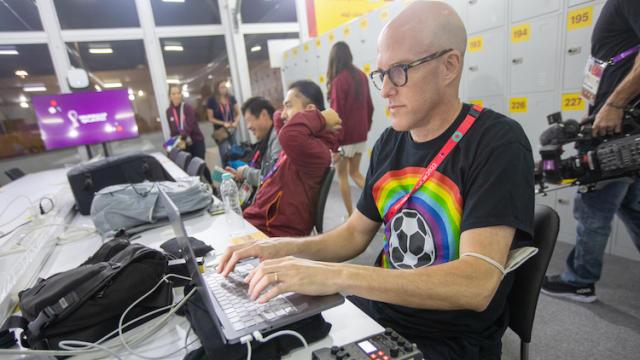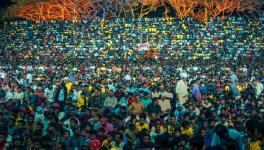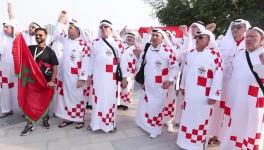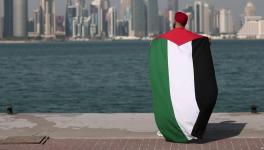The Night Football Lost a Friend and Ally

Grant Wahl, Football writer (1974-2022)
Wahl wrote on Monday that he felt unwell and had received treatment at the medical clinic in the main media centre. “My body finally broke down on me,” he said. “Three weeks of little sleep, high stress and lots of work can do that to you.”
But such is the nature of football, and the gig economy, that the show must go on. On Friday, Wahl was seated in the media tribune, located in the upper-most tier of the massive 88,000-seater stadium when he collapsed as the game went into extra time. Journalists seated around him immediately started to remove the chairs at the media desks to make room and called for medical attention. The Times of India’s senior sports writer Siddharth Saxena was seated in the row behind. “Down below, on the pitch, the game was so intense that at first, we thought a fight had broken out among some journalists,” he told NewsClick. “But then they began calling frantically for medical staff, who arrived quite quickly and began helping however they could. I could see two sets of medics administering chest compressions, etc. This went on for quite some time. The stadium design also made it very difficult for them to figure out how to evacuate him. By the time they finally managed to get him out, via the upper exit, it had already been about 40 minutes. That’s the thing with preparing for such emergencies; you only really know when the situation arises for real.”
After the post-match press conference, Saxena, myself and other colleagues who had been around at the time of the incident asked a FIFA media officer for an update. “He is in a hospital,” we were told. “Inshaallah, he will recover but I cannot share any further details.” By this time it was already half past two in the morning. We would wake up to confirmation of the worst possible news.
Wahl is, perhaps, the most well-known football journalist from the US. He developed an interest in the sport while at college in Princeton and, by the early-2000s, was among the handful of full-time football reporters (at least those writing in English) in the US. He spent 23 years at Sports Illustrated and was the first writer to get football on the cover of the magazine otherwise dominated by US sports. I got to know Wahl when I joined the India edition of the magazine in late 2010 and we first met in 2012 while we were both covering the Euros in Poland and Ukraine for our respective editions. At that time I knew little about his work and nothing of him as a person. “Who is this guy,” I thought with what I later identified as jealousy. “What does an American know about football that makes him such a hotshot in an industry where otherwise a non-European is a non-entity?”. In the world of football journalism, there is often more jealousy–it’s a cutthroat multi-billion-dollar industry that feeds on favouritism and opportunism and where racism is systemic–than respect. With Grant (I think I will call him by his first name for this, more personal, part) it was different. Within the first few minutes he showed me how petty my preconceived notions were. Grant was immediately warm, gentle and displayed a wide understanding of not just the sport, but the politics that dominated its uppermost echelons. He would ask questions and was keen to know more about the scene in India. Later I would discover his commitment to ideas of justice and equality. Such as how he spent far more time covering the women’s game, and bringing up issues of inequality there, than most of our even more famous colleagues from Europe. And, though we might not always assess a player or a game in the same way, it was these broader notions of football and what makes the sport unique that gave us much common ground.
As a person Grant was always willing to help. The year Gurpreet Singh Sandhu, the India’s men’s team’s current first-choice goalkeeper, went to play club football for Stabaek in Norway, is one example that comes to mind. Bob Bradley, an American, was head coach of the club at the time. When I told Grant that Sandhu was the first Indian to play top-flight football in Europe he was excited. But rather than fly down to Oslo and do the story himself, he put me in touch with Bradley without a second thought and asked that he give me some time.
He also found interesting ways to blend journalism with activism. In Qatar he wore the rainbow flag to the stadium on the first day of the tournament, testing the Supreme Committee’s resolve to welcome everyone. He was briefly denied entry before receiving an apology from security at the Ahmad bin Ali stadium and let in. Going back a bit to 2010, after Russia and Qatar were awarded their respective world cups, he gathered the support of many of his followers and tried to contest as the “people’s choice” for the post of FIFA president. Cynics called it a gimmick at worst, or a fool’s errand at best. But Grant was able to show, when not a single one of it’s at the time 208 member associations endorsed his nomination, just how much fear, money and power (synonyms, perhaps), control the game.
For football in the US, losing Grant is a much bigger blow than going out of the tournament itself. “The entire US Soccer family is heartbroken to learn that we have lost Grant Wahl,” the US Soccer Federation said on Twitter. “Here in the United States, Grant’s passion for soccer and commitment to elevating its profile across our sporting landscape played a major role in helping to drive interest in and respect for our beautiful game. As important, Grant’s belief in the power of the game to advance human rights was, and will remain, an inspiration to all.”
The last time I saw Grant was a couple of days ago at the Main Media Centre in Doha. He was going up an escalator and I, down. We said hi and that we’d meet up soon. A stark reminder that time isn’t always on our side and football is, at the end of the day, just a sport. Those of us left behind can only hope to stay true to our own commitments and beliefs. And send our love and thoughts to his family and close ones. Hope they find peace.
Get the latest reports & analysis with people's perspective on Protests, movements & deep analytical videos, discussions of the current affairs in your Telegram app. Subscribe to NewsClick's Telegram channel & get Real-Time updates on stories, as they get published on our website.
























